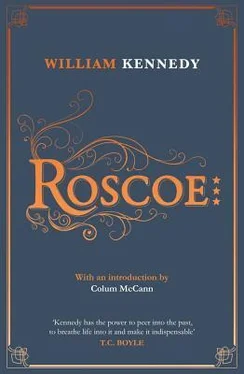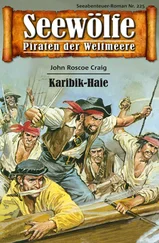“I heard that,” Morty said. “Some cockamamie beer deal with the Thorpe brothers. Mush told me. The Thorpes tried to shoot Bindy, bring their beer into Albany over his dead body. They brought whatsisname in to do the job.”
“Scarpelli,” Roscoe said.
“Scarpelli, a mistake,” Mac said.
“The Thorpes weren’t intelligent,” Morty said.
“They were born short,” Mac said.
“Mush comes in here,” Morty said. “He don’t have money anymore. He ran outa luck. He had it all fixed to get Louie Lepke into the French Foreign Legion and then Lepke surrendered to the FBI through Winchell and they fried him. Mush woulda made a bundle on that Foreign Legion bit.”
“Diamond died broke,” Mac said.
“He shouldn’ta mixed up with the Thorpes,” Morty said.
“I liked Jack one way,” Mac said.
“He could make you laugh,” Morty said. “He lived upstairs when you people were looking for him. Ate his meals here.”
“Cheese and crackers,” said Roscoe.
“He was afraid of cops,” Mac said.
“He took bad beatings from cops,” Morty said.
“He stood up for his rights, and a few lefts,” Mac said. “He was a rat bastard, but I liked him. Almost nobody knows how to like.”
“You liked him?” Roscoe said.
“I saw him at the Parody Club singing with the piano, pretty good voice, skinny little runt, looked like my brother Joey fightin’ lightweight.”
This made sense to Roscoe, the Mac-and-Jack affinity. They even look alike, now that he thinks about their faces: cheerful, crooked smile that goes away and here comes a deadeyed chilblain of a grin. Two sides of the same coin would be stretching it, but consider that they both weighed, in good health, which Jack seldom was, about a hundred and thirty-five, stood five seven, knew how to dude up, loved women and supported several at a time, thrived on crime, shot people when necessary and sometimes when not, both of them notorious and feared — twinned, you might say, but as if separated at birth, and then found their separate ways to the same time, same place: Jack, the mythic ragamuffin of an evil calling, dead at thirty-four when Mac was twenty-five, and Mac, thirty-nine now, scourge of hoodlums, fearless assassin, a political secret, stable as quicksilver, likes Mozart and Claude Thornhill, now fuming at O.B.’s historical revisionism.
You Can Imagine How Mac Felt
Mac heard it from Jack McQuilty, the ex-sheriff who was talking to Patsy and O.B. at a clambake. When the subject of Legs Diamond came up, Patsy said, “O.B. finished Legs,” and O.B. smiled a big one.
But, hey, what about Mac’s contribution?
Does Patsy really know the crime and punishment that went on in the second-floor front at 67 Dove Street that very early morning in December 1931? Mac never talked to Patsy about it, never told anybody the details. Patsy couldn’t begin to know what Jack looked like with two flashlights in his face, illuminating him and the asters, roses, and swirling tendrils of his wallpaper as he sat up in his double bed, not sure what was happening, then sure, but never figuring it would come to this: alone, no pistol, nobody to help him out; nor could he know how his image related vividly in Mac’s mind to the van Gogh painting on Gladys’s parlor wall, the postman in his hat and long, curly beard (Jack was clean-shaven, his hat on the floor) looking out from a floral design of blossoms and swirling tendrils on a field of green from which five hundred black-oval, white-dotted leaves stare like the eyes of the dangerous night. A floral postman is eccentric, but is he more so than Jack against a wall of roses and asters with tendrils, onto which he casts his large shadow, and into which three bullets are about to be fired?
“We told you not to come back,” Mac said.
“Gimme a break, fellas, I’ll get out.”
“Lotta guys asked you for a break and didn’t get it,” O.B. said.
Mac still remembers O.B. putting his pistol against Jack’s forehead. Deferential to O.B.’s senior pistol, Mac lowered his own.
“Five minutes I’m across the city line,” Jack said, turning his head away from O.B.’s barrel.
Nothing. No bang.
“Just five minutes, boys.”
Still no bang. He’s not going to do it.
Mac shines the light on O.B. and sees those eyes, huge like the postman’s white-dotted black ovals, and blank. Mac wonders if he’s even looking where he’s pointing.
He can’t do it.
“Thanks, fellas,” Jack says and moves a leg to get out of bed.
No bang.
Mac raises his arm and fires three shots from the pearl-handled.38 that O.B. gave him after the Polka Dot Gang shootout, and Jack Diamond ceases to be. The papers will get it wrong at first, but the autopsy will show that all three shots entered the left side of the face (Mac’s side of the bed), one into the left cheek, one in front of the left ear, a third forward of that, but upward, because Jack’s head was falling back. After Mac’s three shots, O.B. fires three, but they all go into the wall over fallen Jack. O.B. shoots to miss.
“You think that’s enough?” O.B. says. “I waited a long time for this.”
“Hell, that’s enough for him,” Mac says.
In the front room of the first-floor flat directly below Jack’s room, the landlady, Laura Woods, and the owner of the house, Hattie, who had come by on her predawn rounds of tending the furnaces in her rooming houses, sat in darkness listening to the voices, to the gunshots that sounded like cannons, and to the rapidly descending footsteps. By the light of the street lamp Hattie saw Mac and O.B. get into their red Packard. Mac drove.
Two.38-caliber pistols were found on nearby streets the next day, one with a wooden handle, neither of them Mac’s or O.B.’s, which went into the river. Much was made of the pistols by police and press, and within a few days a Manhattan ballistics expert consulted by Albany Police Chief Dan Spurling would say unequivocally that the woodenhandled pistol was the death weapon. The chief believed the finding would lead to Jack’s gangland assassins. Within six months, Mac would be promoted to detective sergeant, O.B. to captain. O.B. bought Mac a new pearl-handled.38, and they went back out into the night that they ruled, a legendary pair now, more feared than ever as the tale ran in whispers through the streets: Yeah, those two pulled off the killing of the century in this town, one bad bastard gone.
Hitch your.38 to a star. Mac didn’t expect stardom, but began to think he just might live forever on the basis of being the man who put Legs away, solo. But Mac couldn’t say that out loud. So he wrote it in the kid’s composition book where he kept a record of his deeds. Only when the Governor began investigating Albany in 1943 did Mac burn the book, but until then, for twelve years, he and Jack were there on the page, to reconfirm the things that had happened, and that he had not hallucinated them after a binge: “Followed Diamond two days. Execution at Dove Street. Solo. Dead meat.” Mac called it an execution, not a murder, for he had served the highest order of his society, the assignment awesome by itself, nothing like it in his life as a cop. Proud Mac basked in the enormity of the growing legend, until he learned his role in it had been stolen, that he’d been eliminated from a most significant moment in American history: he, the man without whom there wouldn’t even be a moment, eliminated. You can imagine how Mac felt.
The Call
Herman Besch came to the table where Roscoe sat with Morty and Mac to say O.B. was on the line for Mac, the second time he’d called today.
“Tell him I went to Troy to get my laundry,” Mac said.
“He said he’s got people in cars outside and he wants you to go to his office the easy way.”
Читать дальше












